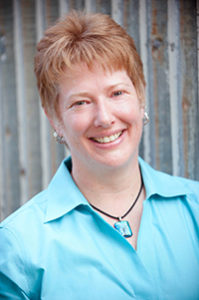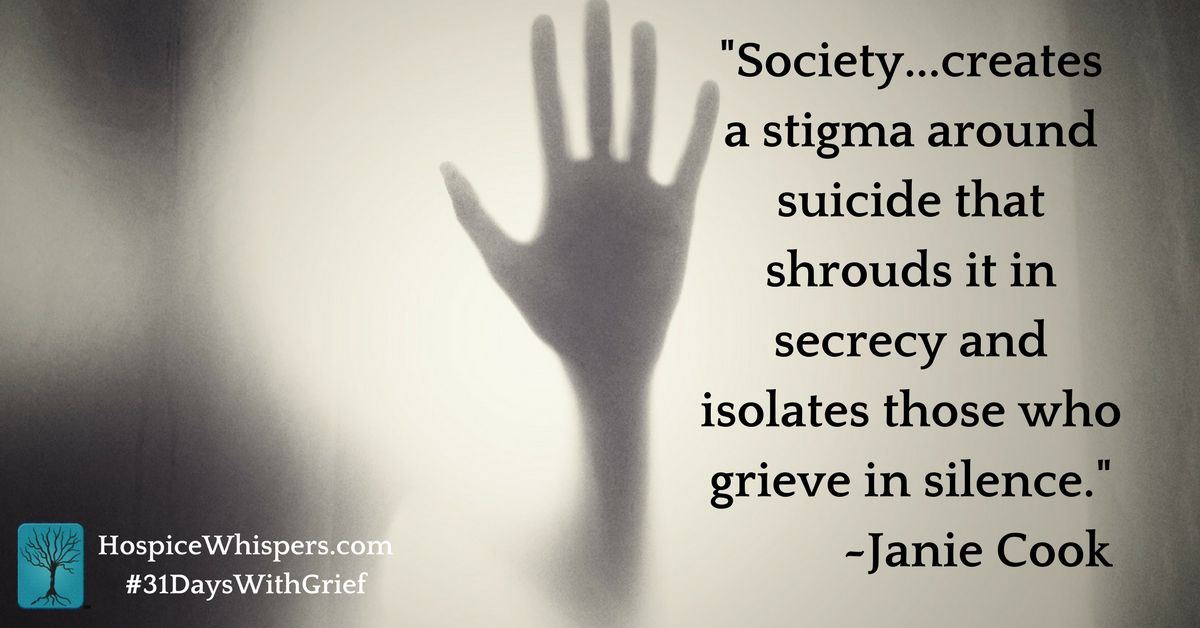31 Days of Walking with Grief: Others’ and Our Own
This is a month-long series to support persons grieving and those who love them. It includes content from “Sharing Our Stories: A Hospice Whispers Grief Support Workbook” available through Amazon and wherever books are sold.
Much of the poetry in Sharing Our Stories was written and graciously offered to the workbook by my friend, Janie Cook. I thank her for agreeing to open her tender heart, once again, and share it with us. You can learn more about Janie and her story at the end of this post.
Day 29—Living with the Misunderstanding of Suicide
by Guest-author, Janie Cook
To lose a loved one to suicide creates a uniquely complicated grief – one that is often deeply misunderstood, because to take in why someone would die this way requires opening up to their immense psychic pain. Society wants to avoid facing that pain, that fear, and in so doing creates a stigma around suicide that shrouds it in secrecy and isolates those who grieve in silence.
Stigma reveals itself in the language society has adopted to describe a death by suicide. The common phrase we hear is that someone “commits suicide “– similar to the way we talk about “committing” a crime or a sin – instantly labeling that person and negatively characterizing their death. Add to that, the judgmental facial expressions, the shame cast upon your loved one and the walls that go up around you as you try to live with this loss and you see the obstructive and destructive impact stigma can have.
Our family has tried to be patient with these comments and see them as a misunderstanding. We try to remember and have compassion for the fear behind them and then, with as much kindness as possible, offer our words of love in describing who our son was and the lethal impact of his acute, untreatable depression.
There is a Hebrew word that has helped me immensely to deal with this part of my mother’s grief. Part of the Jewish Passover Seder ritual ,called the Haggadah, is the word “dayenu” (which means “it is enough” or “it is sufficient”). “Dayenu” is repeated as the refrain in a Passover song that celebrates each one of God’s liberating acts as though it alone would have been enough to bring peace. This song strikes me as a powerful celebration of any one of the moments in our lives when we recognize Love’s gifts as whole and complete.
So, when the stigma of suicide announced to me that Matt’s death was inappropriate to talk about, not worthy of being grieved and therefore woefully misunderstood, I heard healing in this word, “dayenu”, and wrote my own verse to the song:
Matt lived his life in love,
Dayenu.
He gave himself away for those he loved,
Dayenu.
He is remembered with deep-hearted kindness and gratitude,
Dayenu.
He left this life loving us,
Dayenu.
And if we are the only ones who understand,
Dayenu.
More About Janie’s Story, from the Introduction to Sharing Our Stories:
Many of the poems were contributed by friend and colleague, Janie Cook, and are shared with her gracious permission. Janie and her husband have two children—a son and a daughter—and live in Austin, Texas.
Their son, Matt, died of depression through suicide that claimed his life in 2007. They experienced the sudden death of a child and the complicated grief that persons experience when society heaps stigmas born of ignorance and fear on the families of those who make this choice.
It broke their hearts, but also broke their souls open to greater compassion, love, and understanding. It led Janie to begin working as a facilitator of grief groups and to share her experience with others who are mourning, especially after the death of a child, through her blog at livingwiththelossofachild.blogspot.com.
Again, many thanks to Janie, and others, whose words are shared throughout this text.
(from Sharing Our Stories: A Hospice Whispers Grief Support Workbook, (c)2016 p. 4)
 Rev. Carla Cheatham, MA, MDiv, PhD, TRT has served hospices as a chaplain and bereavement coordinator. She’s the Section Leader for the Spiritual Caregivers Section of the National Hospice and Palliative Care Organization and an adjunct professor at the Seminary of the Southwest. Through her Carla Cheatham Consulting Group, Carla provides training and consulting for professional caregivers nationwide. She is the author of Hospice Whispers: Stories of Life and its companion volume, Sharing Our Stories: A Hospice Whispers Grief Support Workbook. Her next book, On Showing Up with Suffering: Others’ and Our Own, is set to publish in 2017.
Rev. Carla Cheatham, MA, MDiv, PhD, TRT has served hospices as a chaplain and bereavement coordinator. She’s the Section Leader for the Spiritual Caregivers Section of the National Hospice and Palliative Care Organization and an adjunct professor at the Seminary of the Southwest. Through her Carla Cheatham Consulting Group, Carla provides training and consulting for professional caregivers nationwide. She is the author of Hospice Whispers: Stories of Life and its companion volume, Sharing Our Stories: A Hospice Whispers Grief Support Workbook. Her next book, On Showing Up with Suffering: Others’ and Our Own, is set to publish in 2017.


